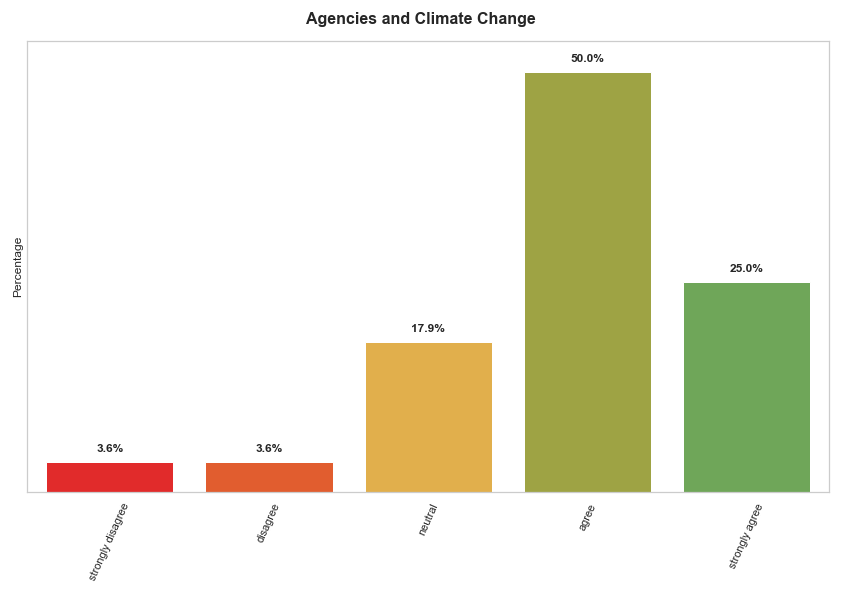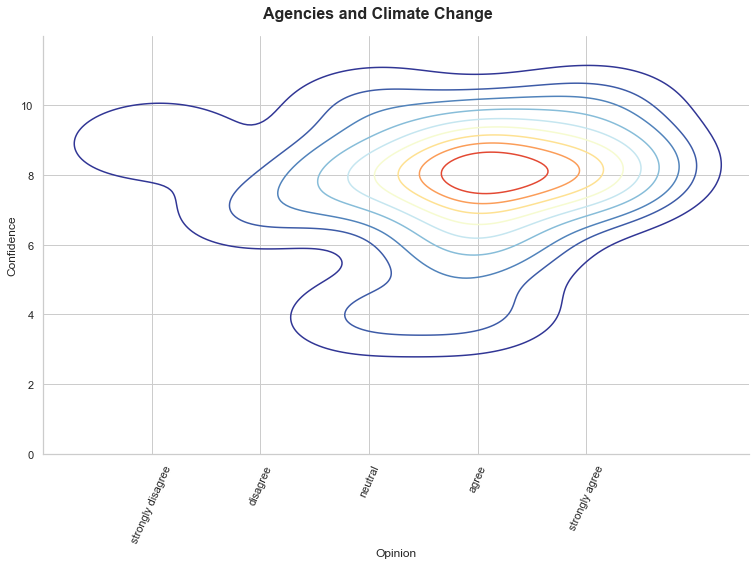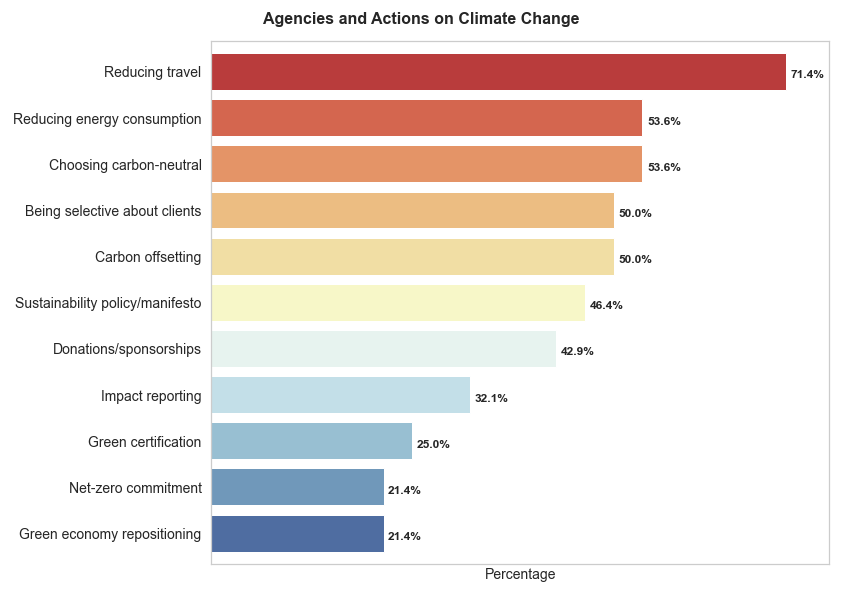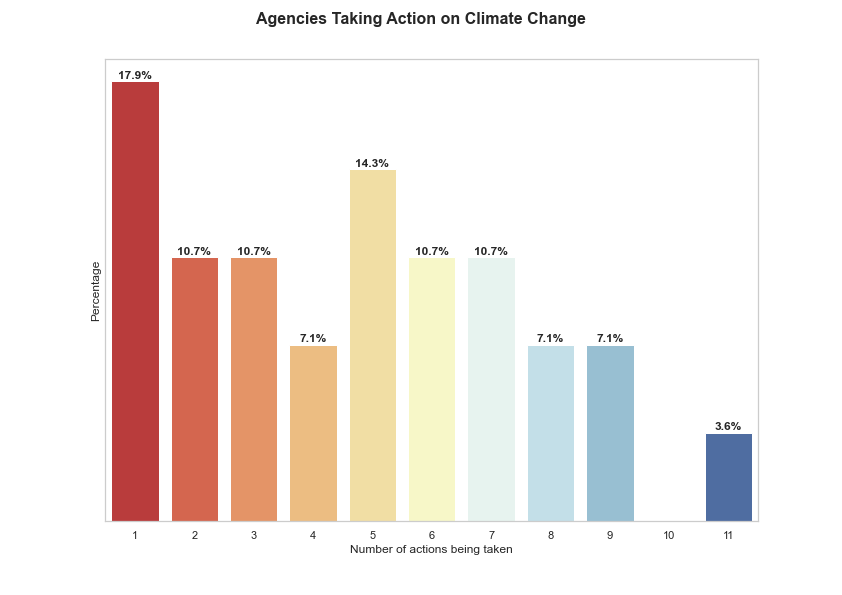Agencies and Climate Change
This Agency Senate Report is taken from the responses of the Agency Senate to the senate survey for October 2021.
We asked Senators about climate change.
We gave the following strong statement, a perspective on the topic that might commonly be expressed by an agency leader, the kind of thing you might hear in conversation with peers talking about trends or strategic positions.
Within the next three years, agencies who are not seen to actively reduce their impact on the environment and take a public stand on green issues will lose out — by losing clients, projects, staff or potential recruits, for example.
We then asked them for their opinion on the statement, and to express their agreement on a scale from strongly agree to strongly disagree.
The Senate's Opinion on
Agencies and Climate Change

The Quick View
The plot is a simple one, a straightforward bar chart of opinions, expressed as proportions.
Percentages here are rounded to the nearest whole number.
- Three-quarters (75%) of Senators agree or strongly agree with the statement.
- One quarter (25%) of Senators neither agree nor disagree, disagree, or strongly disagree with the statement.
On this data alone, three-quarters of Senators are of the opinion that both an agency’s stance and actions on environmental impact will be observed and evaluated by those external to the business within the next three years. In this view, these evaluations will have a measurable impact on the agency, in one form or another.
However, a sizeable minority disagree. In this view, those external to the business are either not interested in the agency’s position on the environment, or as an issue it is substantially lower down the hierarchy of concerns than other considerations.
This, though, is a simplistic view that comes from a relatively simple evaluation.
Senators' Confidence in Their Opinion
We asked Senators to clarify their opinion by also expressing their confidence. This is an important dimension, and its benefit is two-fold.
It enables Senators to express a degree of nuance to their opinion. It also creates some room within the flow of thoughts, to consider the foundations for their opinions — it attempts to move the thinking process from the fast, reactive mode to a slower, more reflective and reasoned pattern. Considering confidence in an opinion gives the opportunity to go back and re-think the view previously expressed.
In order to show how expressions of confidence affect perspectives, rather than add a simple weighting to the opinions above that would’ve simply increased/decreased the length of the bars, we have plotted the data differently — as a 2-dimensional distribution plot, which looks like a heat map, or an isobar plot.

The Quick View
- The centre of perspectives amongst the Senate is clear, with a hot zone in the upper-right of the plot.
- The hot spot is centred on agreeing, with a confidence of around 8/10.
- There is, though, a fairly wide spread of confidence amongst people with this view. Some are more strident in the need to take a position, but a substantial number are far less so.
- There are, however, two clear lobes to the distribution.
- The first is to the left-top — strongly disagreeing with strong confidence.
- The second is the middle-bottom — between neutral and agreeing, but with low confidence.
- These are significant differences of opinion and, though they are minority views, it is important to reflect on the divergence of perspective. There is almost always something significant in the different view.
- Strong disagreement with high confidence suggests that it is important to evaluate to what degree an agency should take a position on climate change. It prompts substantial questions.
- Are the personal views of the agency’s leaders being projected onto the business? Is there commercial evidence or, if not, a rational basis for the agency to take this position?
- To what degree is the agency itself acting on an opinionated issue, or rather should action be taken only by the individuals within it?
- If it is the agency acting, by taking a stance on the issue of climate change, then what are the consequences? — for the business, its owners, its staff team, its clients, and so on.
- In the area where the opinion is either neutral or agreeing but confidence is low, the view is different. This may be indicating a substantial hesitancy, that the paths to either action or inaction are unclear.
- Should the agency be focussed first (or primarily) on commercial concerns?
- Should issues where opinions are divided or more personal be minimised in the business world?
- The answers you come to on these questions may affirm the position you and your agency have already taken. Nonetheless, divergent views should be welcomed and considered with respect, with seriousness and with candour.
- Strong disagreement with high confidence suggests that it is important to evaluate to what degree an agency should take a position on climate change. It prompts substantial questions.
What Senators Say
Senators then had an opportunity to express their reasoning, to give evidence or clarifications for their view.
Here's a representative sample across the views expressed (click a dot to choose).
Confidence: 9
"We have never had a single client or prospect mention this as a factor."
Agency Founder of a PR agency
Founded 2004
Headcount: 30–74
HQ in UK
Confidence: 7
"I still think client care and value will be a more important factor for winning new business, and I do believe that this topic will become more important in the future but I don't think it will be as important in the next 3 years. A lot of agencies won't fully recover from the pandemic until summer 2022, so I think this will be an emerging topic which we start to get to grips within the next 5 years."
CEO and owner of a design agency
Founded 2012
Headcount: 10–29
HQ in UK
Confidence: 4
"I think staff will care a bit more about an obvious environmental stance than clients. My feeling is that agencies won't be penalised for not ‘bigging up’ their green creds, but could increase their chances with some clients if they do so."
CEO of a digital agency
Founded 2005
Headcount: 10–29
HQ in UK
Confidence: 6
"Here in the US, we do not report on climate impact nor do most private businesses. But it is a concern from leadership, from employees (and prospective employees) and I expect it will be from clients. Right now a bigger focus (for both clients and employees) is diversity (DEI) but I think climate will be next behind that."
CEO of a digital agency
Founded 2011
Headcount: 250+
HQ in USA
Confidence: 10
"We have had team members express that they don’t want us pursuing work with companies that are harmful to the planet. We have also won new clients on the basis we are undertaking the journey to become a B Corp. With many of our team having young families, we are very conscious that we want to have a healthier world for them to live in, and as a business it’s our responsibility to ensure doing the right thing is baked into our business model."
CEO and owner/founder of a digital agency
Founded 2004
Headcount: 30–75
HQ in Australia
Agencies Taking Action on Climate Change
We asked the Senators what actions has their agency already taken, are taking currently, or will be doing in the next quarter to respond to the climate crisis and reduce their impact on the environment.
There were 11 items in the list, with an ‘other’ option.
Here’s how Senators are taking action.

The Quick View
- No single item has less than 20% of Senate agencies taking it.
- The top 5 items all have 50% or more of Senate agencies taking them.
- 50% of Senate agencies are being selective about clients in their response to the climate crisis, prepared to let incomes be affected by climate response actions.
- However, just over a fifth are consciously repositioning for opportunities in the green economy.
- The items towards the top of the plot, with higher proportion of agencies taking them, are generally the easier actions to take — reducing travel (remote working during the pandemic has accelerated this change); reducing energy consumption; carbon offsetting.
- It’s notable that the issues that require a degree of transparency are in the bottom half, and the more overt ones towards the bottom — green policy; impact reporting; accreditations and certifications; a net-zero commitment.
- There are several Certified B-Corporations represented in the Senate, a route that enables many of these actions to be achieved, including the more challenging items.
We also analysed the responses to see how many actions agencies are taking to respond to climate change.

The Quick View
This alternative perspective on climate response actions shows some very interesting characteristics.
- It might be expected that this chart would show a half-life kind of shape — a higher proportion at smaller numbers, falling rapidly and then flattening towards a low number taking more actions, since it’s easier to take a smaller number of actions.
- The first few bars follow this pattern, approximately.
- A bell curve shape is the other likelihood, with a clear central peak and lower to either side.
- There is some sign of this shape, with a marked increase in the middle where a cluster of agencies are taking 5, 6 or 7 different actions.
- The number doing 8 or more different things is surprisingly high.
- This aligns with the ‘hot’ centre of the opinion–confidence plot above — substantial agreement with fairly high confidence.
- A large majority of Senators think their agency needs to be seen to respond to the demands of climate change, and are taking action to make it so.
- It should be noted, there are several Certified B-Corporation agencies represented in the Agency Senate.